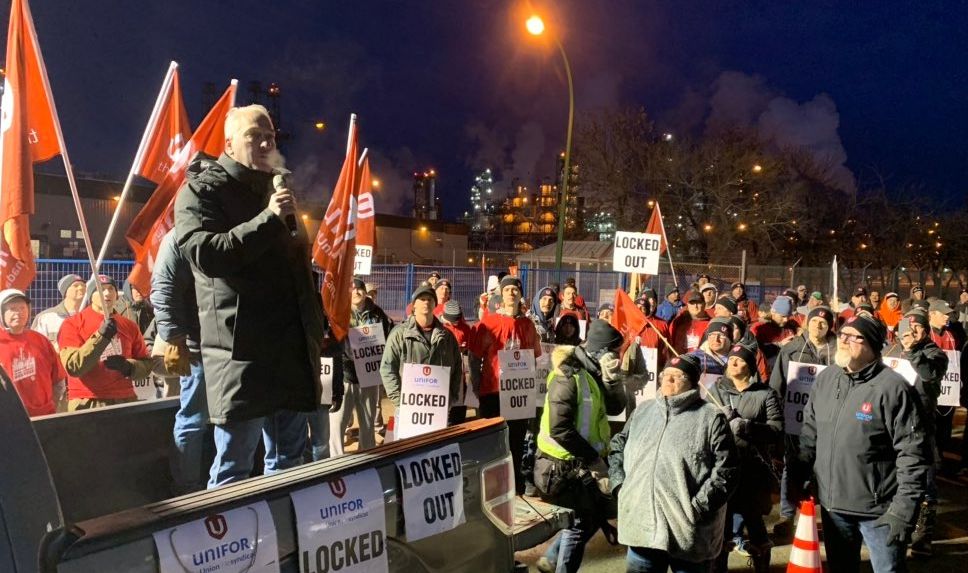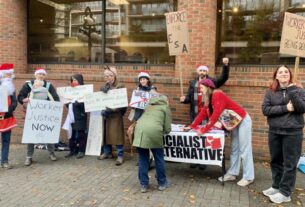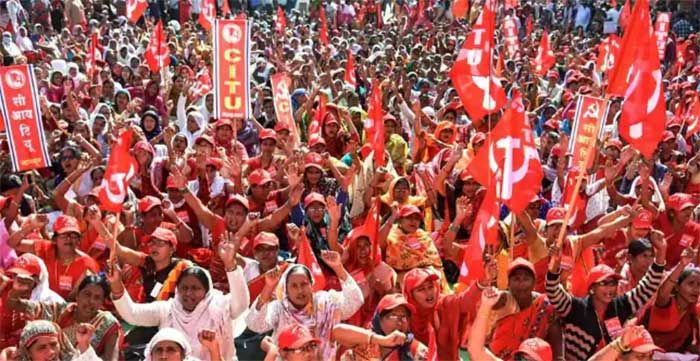On June 22 2020, after a gruelling 6 month lockout, members of Unifor Local 594 who operate the Co-operative Refinery Complex in Regina reached a settlement with their employer, Consumer Co-op Refineries Limited (CCRL). The lockout was an often bitter and at times hostile dispute involving 730 workers. The settlement that was approved by 89% of voting members was nearly identical to the CCRL’s “final offer”, that the workers rejected by the same margin only a month and a half earlier in April.
In the end the union was forced to accept the proposal after exhausting all options under an oppressive and hostile legal regime, compounded by active neglect from the provincial government and no support from community members such as local farmers. Still, in the face of an employer clearly disinterested in making a deal or arguing in good faith, Local 594 stood together in solidarity, and through discipline and principled action, was able to mount a serious campaign of resistance. In the end union members returned to work with a deal and a guarantee that no workers would face reprisals.
The central issue of the conflict was the issue of pensions, and the replacement of so-called “defined-benefit” with “defined-contribution” plans. A defined-benefit pension plan was the standard form of pension starting in the post-WWII period until the 1980. Under this type of plan, the employer agrees to guarantee a certain wage for each worker upon retirement. Although pensions were originally introduced by employers as a way to secure employee loyalty, the percentage of the workforce covered by defined-benefit plans grew strongly after WWII due to the influence of the labour movement. Through collective bargaining, struggle, and strike action, the labour movement was able to force employers to offer better pensions not only to unionized workers, but also for middle class professionals as well.
As part of the wider neoliberal restructuring of capitalist economies since the 1980’s, defined benefit pensions have gradually been replaced with defined contribution plans, which are now by far the most common form. In this scenario employees contribute deductions from their pay into an investment like a mutual fund. These funds are essentially gambling on the stock market, and their ability to pay out is determined by how well the gamble pays off. Employers have no responsibility whatsoever to guarantee the health or output of such plans, and indeed if the funds do not perform well the amount workers receive in retirement can and does shrink.
Through a previous round of bargaining, the union was already forced to concede that new employees would be put onto a defined-contribution plan, in an effort to address the company’s concerns about its ability to keep funding the defined-benefit plan. But this time around CCRL was once again crying poverty over its ability to meet even their commitments even to the fixed number of workers still on a defined-benefit pension.
In negotiations, CCRL citied the fact that in the past four years they had to make $192 million in additional contributions to the plan above what was expected based on their projections. This despite making over $2 billion dollars in profit in the last two years alone! The union rightly argued that there was simply no reason why the employer could not afford to fund the existing plan.
Part of the argument that the company made was that they were facing declining prospects of profitability in the fossil fuel industry in the coming decades, anticipating the necessary transition to renewable energy. Socialist Alternative notes that a prominent player in the industry is able to foresee its own decline. But it is a scandal that their reaction is to attack workers. We suggest that the supporters of expanding fossil fuel extraction as the path to economic prosperity in provincial governments across this country will consider the fact that the industry itself does not believe that it has a strong future.
The concern for workers’ pensions in the face of a collapsing market for fossil fuels is a legitimate one. But the bosses’ are not concerned about workers’ well-being, they are trying to boost profits. This is a problem that must be addressed by a dramatic transformation of the economy through a green-new-deal transition that will guarantee new union jobs with strong pensions for laid off workers.
After making no progress at the negotiating table, the union held a strike vote that was approved by 97.3 percent of voting members. In response, on December 5th 2019, CCRL locked the workers out of the refinery after giving 48 hours notice. There are no regulations against hiring scabs in Saskatchewan. This meant that CCRL was free to hire “replacement workers” for the entire duration of the lockout and to continue their operations.
In addition to completely undercutting the power of the union, the use of scab labour raised serious concerns about safety at the refinery. During the lockout CCRL was running the plant with less than 50% of the workers that the union would run it with, all of whom were inexperienced in the jobs they were expected to do. And indeed, in mid May there was an accident that caused an oil spill into the Regina sewer system. The company did not even notify the City of Regina of the spill, it was discovered by city workers.
Normally, the unionized workers would at least be able to picket the employer’s facility to frustrate the movement of goods in and out, and to dissuade scabs from crossing the picket line. However, a series of decisions by the provincial courts effectively nullified even these limited legal measures available to the union. In an injunction order by Janet McMurty, Regina Court of Queen’s Bench, it was declared that the picketers could only legally delay anyone wishing to enter or exit the refinery for a maximum of 10 minutes, or until the individual in question “expressed a desire to proceed.”
That’s right, the court decision meant that the picketers were legally prevented from delaying for any length of time anyone who so much as expressed a desire to cross. This is a complete nullification of the role and function of a picket line. The union appealed this ruling, but the appeal was not heard until months later, and in the intervening time the police would be able to enforce the injunction.
In January the union erected physical blockades of the refinery to prevent scab workers and trucks from getting in and out of the plant. The union was found in contempt of the injunction and fined $250,000. Regina Police were called in to control the road and remove the blockages, and in one instance 14 union members, including Unifor president Jerry Dias, were arrested and charged with mischief.
What was the role of the provincial government in all this? The current premier of Saskatchewan is Scott Moe of the right-wing Saskatchewan Party. After police removed the blockades erected by the union, the provincial government appointed a special mediator, Vince Ready, to produce recommendations for ending the dispute. Ready took the company to be arguing in good faith and sought to show how to meet the cost-savings targets without gutting the pension plan.
In February, Ready published his report. According to the union, the report was favourable to the employer, but leadership strongly urged the membership to vote in favour of it anyways. In the words of the report, “put bluntly … implementation of our recommendations would result in significant cost savings for the Employer.” The workers were eager to end the lockout and get back to work, and the report was approved for implementation by 98% of voting members.
Nevertheless, CCRL rejected the Ready report and in April responded with a “final offer” demanding further concessions. Of course, it’s not surprising that the company held out for a more favourable deal. They had been able to continue operations the whole time using unrestricted scab labour, meanwhile the union was legally banned from picketing, except as a purely symbolic gesture.
The company’s scandalous rejection of the report was met with calls from the union and the provincial NDP for the government to enact binding arbitration which would force the company to accept the mediators recommendations. The Saskatchewan Party government, of course, refused to take any such action. The government argued that there was no provision in existing law for the government to force binding arbitration in this situation. But this is a spurious argument. Provincial governments across the country have on numerous occasions passed “back-to-work” legislation, i.e. a new law that orders an end to the dispute and obliges both sides to accept the recommendations of a mediator.
Typically back-to-work legislation is used to end a strike, usually because the strike is becoming too effective in its economic impact. The workers are forced to accept the mediators recommendations, which almost always favour the employer. However, the situation at the refinery was not a strike, it was a lockout. Given the balance of power, CCRL was perfectly happy to have the lockout continue to hold out for a better deal. So it’s again no surprise that the right-wing, pro-capital, Saskatchewan Party government would claim that it would be improper to intervene.
The union put CCRL’s “final offer” to a vote in April and it was rejected by 89% of voting members. This left the dispute at an impasse: the union was running out of legal options to put pressure on the company, and CCRL clearly had no problem continuing to hold out for its demands. As a final escalation, the union wrote an open letter to Saskatchewan farmers explaining that they would begin to disrupt their access to fuel during the seeding season. Imploring the farmers to contact their MLA’s about passing legislation to get them back to work, the union explained that purchasing fuel from CCRL would constitute crossing the picket line. The Agricultural Producers Association of Saskatchewan (APAS) leadership stated a wish to remain “neutral.” The APAS argued that “There’s no advantage in picking sides…,” thus picking the side of the employer.
In the end, after receiving information from inside the refinery that management was planning on firing the Local 594 leadership, and after another month and a half of lockout with no movement from the courts, the government, farmers, or management, the union membership accepted a tentative deal. This deal was effectively identical to the CCRL’s final offer that the membership so roundly rejected just a month earlier. The only change was language protecting the returning workers from reprisals, including firings, based on their participation during the lockout.
The deal keeps the defined-benefit pensions for those that have them, but employees will now be required to contribute 4 percent from their wages, with that amount rising to 9.75 percent over the next two years and possibly higher in later years. This is coupled with a 11.75 percent wage increase over the next 4 years as part of a so-called “national pattern.”
The unfavourable conditions for Unifor Local 594, including the lack of restrictions on scab labour, and a hostile court and provincial government, could only have been overcome by truly widespread solidarity of the labour movement. The union’s efforts to blockade trucks going in and out of the refinery are commendable, but they could have been augmented by linking up with other unions and workers that interact with the fuel products at different points of the supply chain. Imagine the difference if the fuel truck drivers were standing in solidarity with the refinery workers and refusing to deliver to or from the complex. Workers are necessary at every step in the supply chain to make the system work and generate profits for the bosses. The potential power of solidarity that extends deeper and wider into this network of workers cannot be understated.
The labour dispute at the Co-operative Refinery Complex highlights the ruthlessness with which capital seeks to claw back the hard won gains of the labour movement. The fact that this consumer co-op acted just like any other private company in this dispute shows how far the cooperative movement has degenerated. It also highlights how the court system and neoliberal governments act as explicitly anti-worker forces on the side of the employer. The capitalist system is unable to manage the climate crisis in a humane way. Companies like CCRL, when faced with challenges due to declining profitability of fossil fuel production, will respond by cutting worker pay and benefits until refineries are forced to close, leaving workers with no job and inadequate pensions.
There is simply no way around this logic when refineries are run for profit. Socialist Alternative demands that if companies are not able to meet their obligations to workers they must be nationalized and put under the democratic control of the workers themselves. The workers are the ones who are actually trained and experienced in how to run the plan safely, as the Local 594 members argued during the lockout. The government must guide the dying fossil fuel sector through its final years, while simultaneously accelerating the transition to a green energy economy and providing the necessary retraining and reemployment with full pensions for workers as their jobs become redundant.



